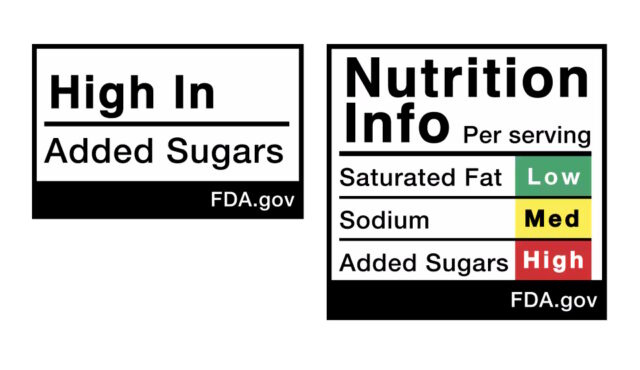
By Lauren Weber – and Rachel Roubein
Your food may soon come with warnings.
The Food and Drug Administration plans to propose labeling this fall for the front of food and drink packages to help Americans make healthier choices to address exploding obesity rates, years after other countries took similar action.
The labels are supposed to flag products containing high levels of sodium, saturated fat or added sugars — common features of ultra-processed foods that make up more than half of the calories Americans consume each day.
But the labeling options under consideration by the FDA are not clear enough to protect Americans’ health, some nutrition experts and lawmakers say, including Sen. Bernie Sanders (I-Vt.), chairman of the Senate health committee who has proposed a stricter system.
“Other countries understand that childhood obesity is a major health crisis,” Sanders said. “We’ve got to do the same.”
The FDA plans to propose adding labels to the front of food packages to help Americans make healthier choices. The Post’s Lauren Weber explains. (Drea Cornejo and Monica Rodman/The Washington Post)
Nearly 20 percent of U.S. children are obese, nearly four times the rate in the 1970s before the proliferation of ultra-processed food, according to the Centers for Disease Control and Prevention. Several studies have identified these industrially produced, hyper-palatable foods as risk factors for chronic diseases shortening life spans in the United States.
Food companies are pushing against the addition of labels to the fronts of packaged foods and dispute the FDA’s argument that doing so can affect Americans’ food choices and obesity rates. Industry representatives warn that such requirements would drive up food prices. They question whether the FDA has the authority to enact such sweeping changes and say companies have grounds to potentially sue the federal government over limiting commercial free speech.
Disclaimer
The information contained in South Florida Reporter is for general information purposes only.
The South Florida Reporter assumes no responsibility for errors or omissions in the contents of the Service.
In no event shall the South Florida Reporter be liable for any special, direct, indirect, consequential, or incidental damages or any damages whatsoever, whether in an action of contract, negligence or other tort, arising out of or in connection with the use of the Service or the contents of the Service.
The Company reserves the right to make additions, deletions, or modifications to the contents of the Service at any time without prior notice.
The Company does not warrant that the Service is free of viruses or other harmful components












